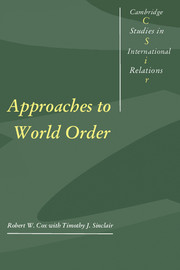Book contents
- Frontmatter
- Contents
- Preface
- Acknowledgements
- Part I Overviews
- Part II Theory
- Part III Interpretations
- Part IV Multilateralism
- 16 The executive head: an essay on leadership in international organization (1969)
- 17 Decision making (with Harold K. Jacobson) (1977)
- 18 Ideologies and the New International Economic Order: reflections on some recent literature (1979)
- 19 Labor and hegemony (1977)
- 20 Labor and hegemony: a reply (1980)
- 21 Multilateralism and world order (1992)
- 22 Globalization, multilateralism, and democracy (1992)
- Complete bibliography of works by Robert W. Cox to 1995
- Index of names
- Index of subjects
- CAMBRIDGE STUDIES IN INTERNATIONAL RELATIONS
18 - Ideologies and the New International Economic Order: reflections on some recent literature (1979)
Published online by Cambridge University Press: 05 June 2012
- Frontmatter
- Contents
- Preface
- Acknowledgements
- Part I Overviews
- Part II Theory
- Part III Interpretations
- Part IV Multilateralism
- 16 The executive head: an essay on leadership in international organization (1969)
- 17 Decision making (with Harold K. Jacobson) (1977)
- 18 Ideologies and the New International Economic Order: reflections on some recent literature (1979)
- 19 Labor and hegemony (1977)
- 20 Labor and hegemony: a reply (1980)
- 21 Multilateralism and world order (1992)
- 22 Globalization, multilateralism, and democracy (1992)
- Complete bibliography of works by Robert W. Cox to 1995
- Index of names
- Index of subjects
- CAMBRIDGE STUDIES IN INTERNATIONAL RELATIONS
Summary
What is the NIEO literature about?
The demand for a New International Economic Order (NIEO), that can be formally dated from the Algiers conference of the nonaligned countries in 1973 and which has been pursued with the backing of these countries in the United Nations and other international institutions, has precipitated a reconsideration of the structure and processes of world political economy among all the principal interests. This has resulted in a large and growing literature that to date, if it has not entirely clarified the problems and issues besetting the world political economy, has at least made it possible to identify certain salient currents of thought about them, each setting forth a mode of analysis and a strategy of action. This essay attempts to survey some of this literature. I take my stand not in some conception of objective science from which to allocate merits and demerits to particular authors, but rather as an observer of the confrontations of ideas, considering the role of ideas in relation to the positions of conflicting forces. The survey cannot claim to be comprehensive, though it does aim to be representative of different perspectives …
Ideological analysis is, of course, a critic's weapon and one most effectively used against the prevailing orthodoxies which, when stripped of their putative universality, become seen as special pleading for historically transient but presently entrenched interests. Social science is never neutral.
- Type
- Chapter
- Information
- Approaches to World Order , pp. 376 - 419Publisher: Cambridge University PressPrint publication year: 1996
- 1
- Cited by

